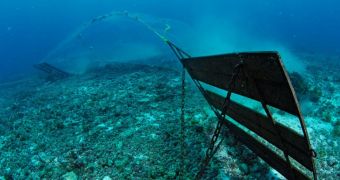A new paper in the journal Proceedings of the National Academy of Sciences documents the impact that bottom trawling has on marine ecosystems on the ocean floor and argues that, all things considered, this fishing practice should be put an end to without delay.
Bottom trawling boils down to dragging a fairly large and rather heavy net across the ocean floor looking to trap cod, squid, shrimp and other aquatic creatures that folks like to feast on and that live in this environment.
The trouble is that this fishing net does not discriminate (don't hooray it for being this open-minded just yet), meaning that it scoops up not just target species, but also fish and other sea dwellers that happen to be around when the net comes by.
Studies have shown that, when compared to other fishing practices, bottom trawling has one of the highest bycatch rates ever documented. In the North Pacific alone, this practice is estimated to be accountable for 82% of the discarded by-catch.
Mongabay informs that, according to recently uncovered evidence, bottom trawling does more than just remove species that fishermen have no intention of catching from their environment. Thus, it upsets marine ecosystems by dislodging sediments.
As in the journal Proceedings of the National Academy of Science, having sediments dislodged from the ocean floor means that several aquatic creatures are left without their natural habitat.
Specifically, areas affected by bottom trawling have been found to house 50% less biodiversity in their sediment deposits, and 52% less organic matter, the same source tells us.
Besides, it is possible that, when these sediment deposits are disturbed, both carbon and pollutants that have spent years trapped under the ocean floor are freed. These compounds can not only affect ocean dwellers that were lucky enough to escape the net the first time, but also fuel climate change and global warming.
“Deep-sea trawling is currently carried out along large sectors of the oceans, and it appears to have severe consequences on deep-sea sediment dynamics at a global scale,” the specialists who carried out this investigation write in their paper.
“Ultimately, intensive and chronic bottom trawling is deemed to transform large portions of the deep continental slop into faunal deserts and highly degraded seascapes,” they go on to explain.
To make matters even worse, it appears that, unlike land ecosystems, marine ones take longer to recover from environmental disasters like those caused by bottom trawling. This means that, when turned into an underwater desert by this fishing practice, a given part of the ocean will need more time to get back on its feet.

 14 DAY TRIAL //
14 DAY TRIAL //